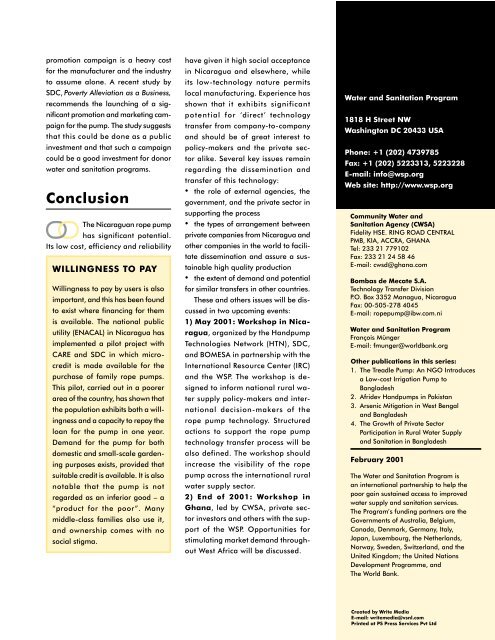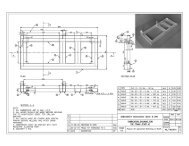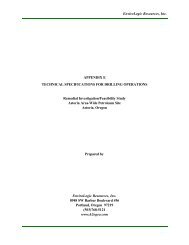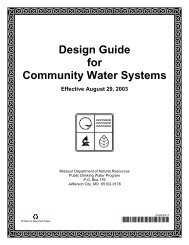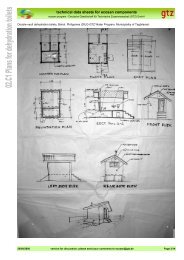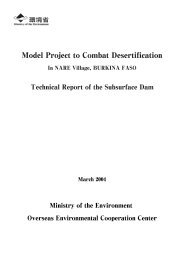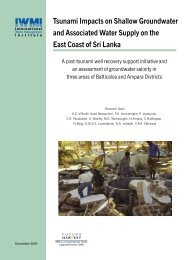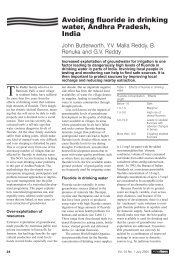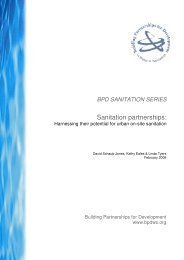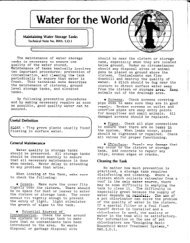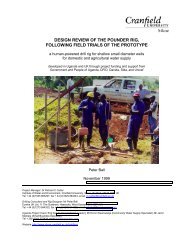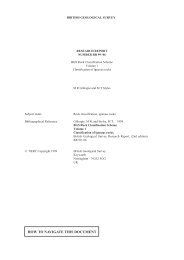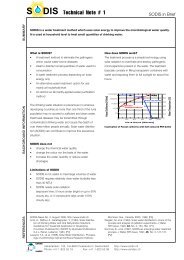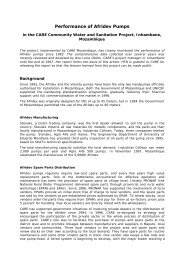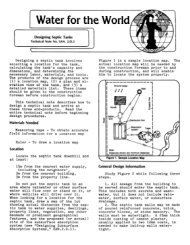The Rope Pump - The Water, Sanitation and Hygiene
The Rope Pump - The Water, Sanitation and Hygiene
The Rope Pump - The Water, Sanitation and Hygiene
- No tags were found...
You also want an ePaper? Increase the reach of your titles
YUMPU automatically turns print PDFs into web optimized ePapers that Google loves.
promotion campaign is a heavy costfor the manufacturer <strong>and</strong> the industryto assume alone. A recent study bySDC, Poverty Alleviation as a Business,recommends the launching of a significantpromotion <strong>and</strong> marketing campaignfor the pump. <strong>The</strong> study suggeststhat this could be done as a publicinvestment <strong>and</strong> that such a campaigncould be a good investment for donorwater <strong>and</strong> sanitation programs.Conclusion<strong>The</strong> Nicaraguan rope pumphas significant potential.Its low cost, efficiency <strong>and</strong> reliabilityWILLINGNESS TO PAYWillingness to pay by users is alsoimportant, <strong>and</strong> this has been foundto exist where financing for themis available. <strong>The</strong> national publicutility (ENACAL) in Nicaragua hasimplemented a pilot project withCARE <strong>and</strong> SDC in which microcreditis made available for thepurchase of family rope pumps.This pilot, carried out in a poorerarea of the country, has shown thatthe population exhibits both a willingness<strong>and</strong> a capacity to repay theloan for the pump in one year.Dem<strong>and</strong> for the pump for bothdomestic <strong>and</strong> small-scale gardeningpurposes exists, provided thatsuitable credit is available. It is alsonotable that the pump is notregarded as an inferior good – a“product for the poor”. Manymiddle-class families also use it,<strong>and</strong> ownership comes with nosocial stigma.have given it high social acceptancein Nicaragua <strong>and</strong> elsewhere, whileits low-technology nature permitslocal manufacturing. Experience hasshown that it exhibits significantpotential for ‘direct’ technologytransfer from company-to-company<strong>and</strong> should be of great interest topolicy-makers <strong>and</strong> the private sectoralike. Several key issues remainregarding the dissemination <strong>and</strong>transfer of this technology:• the role of external agencies, thegovernment, <strong>and</strong> the private sector insupporting the process• the types of arrangement betweenprivate companies from Nicaragua <strong>and</strong>other companies in the world to facilitatedissemination <strong>and</strong> assure a sustainablehigh quality production• the extent of dem<strong>and</strong> <strong>and</strong> potentialfor similar transfers in other countries.<strong>The</strong>se <strong>and</strong> others issues will be discussedin two upcoming events:1) May 2001: Workshop in Nicaragua,organized by the H<strong>and</strong>pumpTechnologies Network (HTN), SDC,<strong>and</strong> BOMESA in partnership with theInternational Resource Center (IRC)<strong>and</strong> the WSP. <strong>The</strong> workshop is designedto inform national rural watersupply policy-makers <strong>and</strong> internationaldecision-makers of therope pump technology. Structuredactions to support the rope pumptechnology transfer process will bealso defined. <strong>The</strong> workshop shouldincrease the visibility of the ropepump across the international ruralwater supply sector.2) End of 2001: Workshop inGhana, led by CWSA, private sectorinvestors <strong>and</strong> others with the supportof the WSP. Opportunities forstimulating market dem<strong>and</strong> throughoutWest Africa will be discussed.<strong>Water</strong> <strong>and</strong> <strong>Sanitation</strong> Program1818 H Street NWWashington DC 20433 USAPhone: +1 (202) 4739785Fax: +1 (202) 5223313, 5223228E-mail: info@wsp.orgWeb site: http://www.wsp.orgCommunity <strong>Water</strong> <strong>and</strong><strong>Sanitation</strong> Agency (CWSA)Fidelity HSE. RING ROAD CENTRALPMB, KIA, ACCRA, GHANATel: 233 21 779102Fax: 233 21 24 58 46E-mail: cwsd@ghana.comBombas de Mecate S.A.Technology Transfer DivisionP.O. Box 3352 Managua, NicaraguaFax: 00-505-278 4045E-mail: ropepump@ibw.com.ni<strong>Water</strong> <strong>and</strong> <strong>Sanitation</strong> ProgramFrançois MüngerE-mail: fmunger@worldbank.orgOther publications in this series:1. <strong>The</strong> Treadle <strong>Pump</strong>: An NGO Introducesa Low-cost Irrigation <strong>Pump</strong> toBangladesh2. Afridev H<strong>and</strong>pumps in Pakistan3. Arsenic Mitigation in West Bengal<strong>and</strong> Bangladesh4. <strong>The</strong> Growth of Private SectorParticipation in Rural <strong>Water</strong> Supply<strong>and</strong> <strong>Sanitation</strong> in BangladeshFebruary 2001<strong>The</strong> <strong>Water</strong> <strong>and</strong> <strong>Sanitation</strong> Program isan international partnership to help thepoor gain sustained access to improvedwater supply <strong>and</strong> sanitation services.<strong>The</strong> Program’s funding partners are theGovernments of Australia, Belgium,Canada, Denmark, Germany, Italy,Japan, Luxembourg, the Netherl<strong>and</strong>s,Norway, Sweden, Switzerl<strong>and</strong>, <strong>and</strong> theUnited Kingdom; the United NationsDevelopment Programme, <strong>and</strong><strong>The</strong> World Bank.6Created by Write MediaE-mail: writemedia@vsnl.comPrinted at PS Press Services Pvt Ltd


